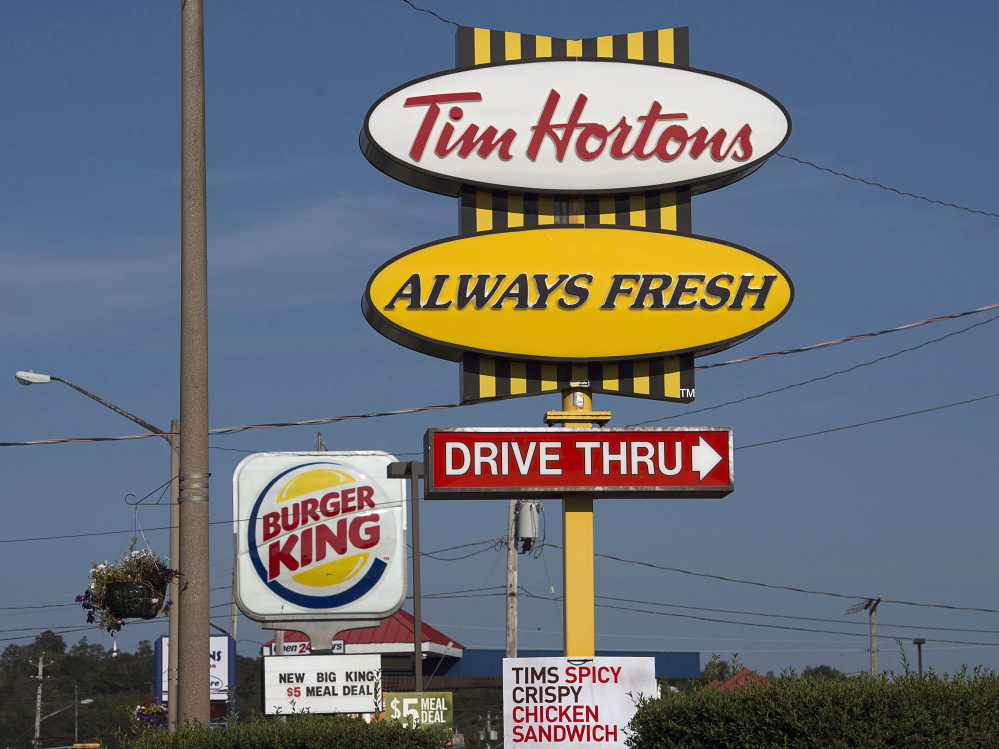Yet another American company is aiming to move its headquarters out of the country.
International fast food behemoth Burger King Worldwide is in talks to buy Canadian chain Tim Hortons, which sells coffee, donuts, and other breakfast food fare. The deal, as it is being discussed, would merge America’s second-largest burger chain, which is valued at nearly $10 billion, with the Canadian equivalent to Dunkin’ Donuts, which is valued at more than $8 billion. It would also move the new company’s headquarters to Canada, where corporate taxes are significantly lower.
The newly merged company would become the world’s third-biggest “quick service restaurant company,” with more than 18,000 restaurants in 100 countries, said Burger King and Hortons in a statement. The deal would create a business capable of rivaling Yum Brands, which owns Taco Bell and Pizza Hut, and is valued at more than $30 billion. But while Yum Brands operates from Louisville, Ky., the new Burger King and Tim Hortons parent company would likely station itself in the Ontario province of Canada.
On the surface, the reason for a headquarter shift across the country’s northern border is simple: lower corporate taxes.
When a company reincorporates abroad, as the practice is known, what it’s really doing is shifting its corporate citizenship; and when a company shifts its corporate citizenship, what it’s really doing is trying to pay less in taxes. The effective corporate tax rate in the U.S., which combines national, state, and city-level tax rates, is nearly 40 percent – the highest across all 34 Organization for Economic Cooperation and Development member countries. Canada’s, by comparison, is just over 26 percent.
Burger King would hardly be the first large American corporation to move its headquarters – more than 70 U.S. companies have reincorporated overseas since the early 1980s. The practice has been especially popular lately – more than half of those inversions have come since 2003, or almost double the amount that did in the 20 years prior, according to data from Congressional Research Service.
The increasing popularity of tax inversions has prompted discussions about how to close – or at the very least thwart – the sort of loopholes that allow tax flight in the first place. President Obama has expressed concerns about the practice and its imminent growth. “We don’t want to see this trend grow,” he said at a news conference earlier this month. And the Treasury Department is already working to assemble a list of ways to help curb the maneuver.
A Burger King reincorporation, however, would be different from most of those that would have preceded it. The Miami-based burger slinger would be one of the most visible to move overseas. The vast majority of corporate headquarter hauls have been executed by pharmaceutical companies, whose brand equity is far less important to sales. Burger King’s business, by comparison, stands to be more significantly impacted if there is any public backlash.
While it’s possible that the plan to reincorporate might be part of need to appease Canadian authorities, which, according to the Investment Canada Act, could block the merger if they believe it is not in the best interests of the country, it would still carry a significant shift in tax payments to the U.S. government.
Independent of what the merger might mean for the company’s corporate tax rates, there are compelling reasons for why one of America’s largest burger chains might choose to team up with Canada’s biggest coffee house.
For one, Burger King has been itching to gain a greater share of the coveted American breakfast market.
Copy the Story LinkSend questions/comments to the editors.



Success. Please wait for the page to reload. If the page does not reload within 5 seconds, please refresh the page.
Enter your email and password to access comments.
Hi, to comment on stories you must . This profile is in addition to your subscription and website login.
Already have a commenting profile? .
Invalid username/password.
Please check your email to confirm and complete your registration.
Only subscribers are eligible to post comments. Please subscribe or login first for digital access. Here’s why.
Use the form below to reset your password. When you've submitted your account email, we will send an email with a reset code.